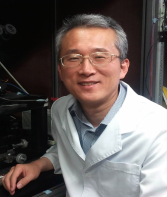Eunjoon Kim
Appearance
This article has multiple issues. Please help improve it or discuss these issues on the talk page. (Learn how and when to remove these messages)
|
Eunjoon Kim | |
|---|---|
 김은준 교수 | |
| Born | Jan 20, 1964 |
| Nationality | Korea |
| Alma mater | Michigan State University |
| Scientific career | |
| Fields | Department of Neuroscience |
| Institutions | KAIST |
| Doctoral advisor | James L. Bennett |
Eunjoon Kim is a professor of KAIST and director of Center for Synaptic Brain Dysfunctions within the Institute for Basic Science (IBS). He graduated from Busan National University in 1986, received master's degree at KAIST in 1988, received PhD degree at Michigan State University in 1994, and worked at Harvard Medical School as a postdoctoral fellow during 1995-1996. His current researches focus on molecular organization of neuronal synapses and synapse dysfunction-related psychiatric disorders.
Awards
- 2013. POSCO Chungam Award, POSCO
- 2012. Inchon Award, Dong-A Ilbo
- 2012. Life Science Award, Korean Society for Molecular and Cell Biology
- 2011. Best Research Award, KAIST[1]
Education
- 1982. 3 – 1986. 2 B.S., Dept of Pharmacology, Busan National University, Korea
- 1986. 3 – 1988. 2 M.S., Dept of Biological Engineering, Korea Advanced Institute of Science and Technology (KAIST), Korea
- 1991. 9 – 1994. 12 Ph.D., Dept of Pharmacology and Toxicology, Michigan State University[2]
Work
- 1988. 3 – 1991. 8 Research Associate, Korea Research Institute of Bioscience and Biotechnology, Daejeon, Korea
- 1995. 1 – 1997. 2 Postdoc, Dept of Neurobiology and Howard Hughes Medical Institute, Harvard Medical School.P.I.: Morgan Sheng
- 1997. 3 – 2000. 2 Assistant Professor, Dept of Pharmacology, Busan National University, Korea.
- 2000. 3 – 2014 Assistant, Associate, & Full Professor, Dept of Biol. Sci., KAIST, Korea.
- 2003. 7 – 2012.5 Director, National Creative Research Initiative Center for Synaptogenesis, Korea
- 2012. 6 – present Director, Center for Synaptic Brain Dysfunctions, Institute for Basic Science (IBS), KAIST, Korea[3]
References
- ^ Eunjoon, Kim. "Google Scholar". Google Scholar.
- ^ Kim, Eunjoon. "Michigan State University".
